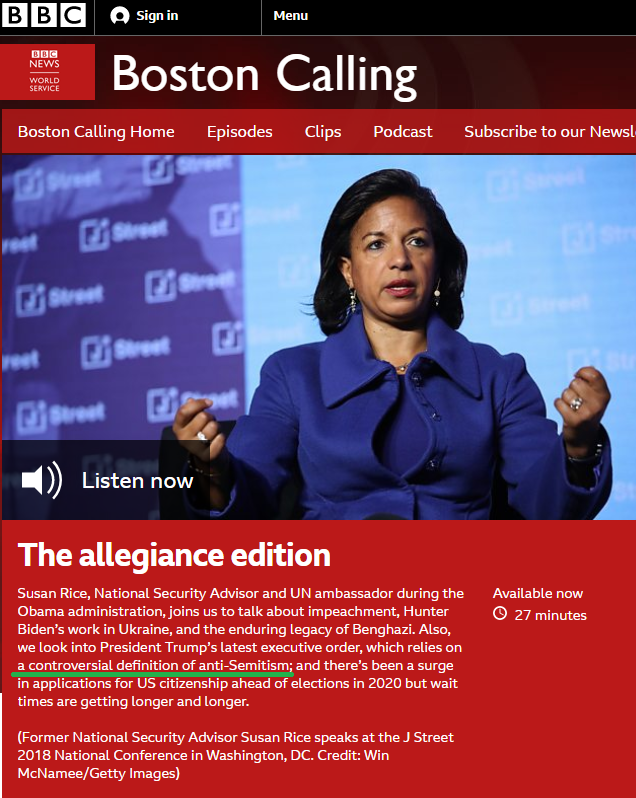As we have recorded here in the past, the BBC has often failed to give its audiences a clear and accurate portrayal of Iran’s military entrenchment in Syria and Iranian financing and supply of weapons to the Lebanese terror group Hizballah.
The BBC, Iran and faux objectivity
Iranian military activity in southern Syria under-reported by BBC
BBC audiences have been repeatedly encouraged to view Israeli actions against the supply of Iranian arms to Hizballah as ‘involvement’ in the Syrian civil war.
BBC says what it said was happening in 2013 may be happening now
BBC News again claims Israeli involvement in Syria’s war
BBC Syria war backgrounder recycles inaccurate claim
Moreover, the BBC rarely reports on Iran’s serial threats against Israel.
BBC ECU upholds complaint concerning Iranian threats to Israel
BBC News promotes Iranian missile ‘deterrent’ propaganda
It was therefore refreshing to see BBC Radio 4 taking a step in the right direction – albeit only for domestic audiences – in the April 15th edition of ‘The World This Weekend’.
A significant proportion of that programme was devoted to the previous day’s strikes on targets in Syria by the US, the UK and France. After domestic aspects of the story had been discussed, presenter Jonny Dymond introduced (from 09:50 here) another Syria related topic.
Dymond: “106 years ago today the captain of the Royal Merchant Ship Titanic breathed a sigh of relief. Thanks to some sharp steering, the ship had apparently avoided the iceberg poking out of the freezing seas. Those allowing themselves to exhale after the airstrikes on Syria by the West early on Saturday morning might bear the fate of the Titanic in mind. There was much more to the iceberg than met the eye. Saturday’s attacks were not the only strikes from beyond Syria’s borders this week.”
Listeners heard a recording of a related news bulletin before Dymond continued:
Dymond: “On Monday war planes widely believed to be from Israel sent missiles into a Syrian airbase known as T4 situated between the city of Homs and the ruins of Palmyra. More than a dozen people were killed, most of them believed to be Iranians.”
It would of course have been helpful to listeners had they been informed that seven of the Iranians killed were members of the Iranian Revolutionary Guards Corps. Dymond went on:
Dymond: “It was not the first time T4 had been struck. Back in February Israeli war planes hit the base, amongst other targets, in retaliation for the incursion of a drone into Israeli airspace and the subsequent downing of an Israeli jet.”
Two days before this programme was aired Israel had announced that the Iranian UAV was armed with explosives but listeners were not given that information. Dymond then continued with what is for the BBC an unusually lucid portrayal of Iranian activities in Syria.
Dymond: “Iran now reaches deep into every nook and cranny of Syria. Its military advisors direct operations on the ground. It sponsors Hizballah, the Lebanese militia that has thousands of fighters in Syrian territory. It pays and arms the thousands of Shia faithful that have come from around the world to fight for Bashar al Assad. It has established a web of military positions and bases up and down the west of the country. Its cash has sustained Syria’s war economy. Salman Shaikh runs a political consultancy firm that mediates on conflicts in the Middle East.”
Shaikh: “It’s been very, very determined. It had understood from the start that Syria was a state – even a failed state – which needed to belong in its column rather than in the Western alliance and it’s done everything it can since this war started – this civil war, this conflict started – to make sure of that. It was the one that first rescued Assad’s forces in 2012 by sending in military advisors and since then it’s probably 50,000 or so Iranian backed Shia militias coming from around the world who are now part of the conflict in Syria. But on top of that, they have been trying to exact a price – economic – from the regime, social and of course on the military. This is a full full-court press from the Iranians to establish themselves.”
Dymond: “To its regional rivals Iran is an imperial threat. The talk is of a crescent of influence stretching from Iran itself, west through Iraq – now led by Iran-friendly Shia Muslim politicians – into Syria and on into Lebanon where Iranian sponsored Hizballah is in government. For the Sunni Muslim powers such as Saudi Arabia such influence is deeply troubling. But Israel, which borders both Syria and Lebanon, perceives the expansion in Iranian might as a threat to its very existence.”
Unfortunately, as noted above, BBC audiences have long been denied the background information which would help them understand why Israel’s perceptions are such but at least listeners to this programme did get to hear an accurate portrayal of Israel’s view of Iran related issues in Syria.
Dymond: “Jerusalem-based political analyst Jonathan Spyer.”
Spyer: “Israel’s key concerns throughout the conflict have been, I think, twofold. Firstly that the conflict should not allow the transfer of sophisticated…certain sophisticated weapon systems from Iran via Syria to Hizballah in Lebanon. And then secondly Israel’s concern has been to prevent the Iranians and their allies from reaching the border with the Golan Heights. Israel’s becoming increasingly concerned about the build-up of Iranian infrastructure in southern Syria and that’s, I think, the context in which you see the recent raid on the T4 airbase near Palmyra.”
No BBC programme is of course complete without a tick of the impartiality box – however irrelevant.
Dymond: “Iran is traditionally presented as the aggressor in the region; an expansionist power that is dedicated to the destruction of the State of Israel. But as Azadeh Moaveni – former Middle East correspondent for Time Magazine and co-author of ‘Iran Awakening’ – says, Iran sees itself very differently.”
Moaveni: “I think they do see themselves in marked contrast to how they’re perceived, you know, in the West and certainly by the Arab Gulf states as on the back foot. They see these policies that they pursued in Yemen, in Syria, as what they call forward defence. You know this is their perception of it – they’re conventionally militarily very weak. They are shut out of the global financial system. They kind of hobbled along but they do not see themselves in a position of any kind of potential normalcy. And I think that feeling of solitude, as was mentioned in a recent report, kind of drives its security view.”
Dymond was not however distracted:
Dymond: “Forward defence may be how it seems to Iran but Israel’s alarm grows week by week and month by month as it sees Iran establishing military bases in Syria, transferring drone technology there and building a supply route through to Hizballah in Lebanon. Salman Shaikh.”
Shaikh: “It now takes us to a very dangerous situation because the Israelis will not allow that to happen. They may be too late – and I think within Israeli circles there is that fear – but that only just means that we’re actually at a heightened sense of tension.”
Dymond: “And within Israel, where once there was division between the military and political establishment over the need to face down Iran, now – says Jonathan Spyer – there is unity.”
Spyer: “Unlike in the period six, seven years ago when the issue of a possible raid on Iranian nuclear facilities was coming up, now the sense is that the conception whereby Iranian entrenchment in Syria represents a grave and urgent danger to Israel is as much emerging from the security echelon as from the political echelon. So given that, the near unanimity of the system makes it quite likely that that will be acted upon. It’s a very serious professional red line being expressed and it’s not simply political rhetoric.”
Dymond: “Bashar al Assad has consolidated his position mightily over the past year. Both rebel groups and so-called Islamic State have been driven back with the help of Russian air power and Iranian sponsored boots on the ground. You might think stability would follow but as US policy twists and turns in the breeze of President Trump’s Twitter feed, US allies are thinking of how they might have to act on their own. Israel will not stand idly by as its enemy moves ever closer to its borders.”
Next time the BBC tells its audiences that Iran has “been accused” of building up its military presence in Syria or “been accused” of supplying weaponry to Hizballah, this programme will serve as a useful reminder that in fact the BBC is well aware of Iran’s activities and that the corporation’s habit of qualifying that information with faux ‘objectivity’ is nothing but a barrier to the understanding of its funding public.




